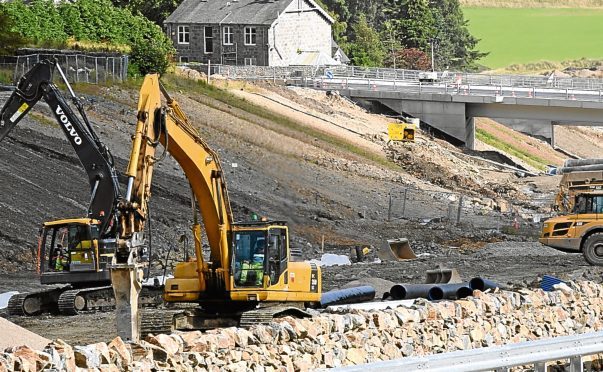Scottish ministers were last night under pressure to take “decisive action” to ensure Aberdeen’s £745million bypass is not derailed by the collapse of a key contractor.
The huge project was plunged into uncertainty after it was confirmed yesterday that Carillion, the UK’s second largest construction company, had entered liquidation.
The firm’s two consortium partners, Balfour Beatty and Galliford Try, were “urgently” discussing ways to “minimise any impact” on the long-awaited north-east scheme.
But both companies witnessed their share price drop after they admitted facing a hit of up to £80million due to their contractual obligations to complete the 36-mile road.
And transport chiefs – who have repeatedly said detailed contingency plans were in place – could not offer guarantees that the road would still open in April as planned.
The Holyrood government said only that it was “working closely” with the remaining consortium partners to “understand the impact” on jobs and the timetable.
City council co-leader Jenny Laing last night demanded urgent clarification of the likely impact on jobs and the delivery of the project.
“With the collapse of Carillion it is important that the Scottish Government confirms to the Council what steps they are taking to ensure the AWPR is completed on time and within budget.
“The council limited its financial exposure to £75million for the AWPR and I have asked our chief executive for a full brief on the impact of the demise of Carillion.”
Aberdeenshire East MSP Gillian Martin has lodged a topical question on the issue which ministers will have to answer at Holyrood today.
Up to 200 Carillion employees were working on the bypass project and trade union representatives said it was a “difficult time” for the staff amid a “lot of uncertainty”.
Unite official John Clark had heard that the workers had been told to report as normal today, but that they would only be paid until the end of January.
“We’ve just had notification that things are allegedly going to be carrying on as normal but I can’t see how that can happen,” he said.
“The government has obviously stepped in to keep it going. That’s what we’ve heard.”
He added: “It’s a difficult time for the workers and it’s a difficult time for us as a union to analyse what is going to happen because there’s a lot of uncertainty.”
Workers on the bypass had their fuel cards declined yesterday following the firm’s collapse.
The issue, which was resolved by the afternoon, also affected staff in other parts of the UK.
Train cleaners employed by the company were told to work as normal but their fuel cards bounced, according to the Rail, Maritime and Transport (RMT) union.
The RMT said it was the start of the “brutal reality” facing staff.
Transport Scotland said it was unable to confirm whether the card issue was connected to the company.
A Transport Scotland spokesman said: “The contractor has confirmed that a number of fuel cards were declined at petrol stations in the morning.
“However, we understand that this situation has now been resolved and that fuel cards are now being accepted.”
